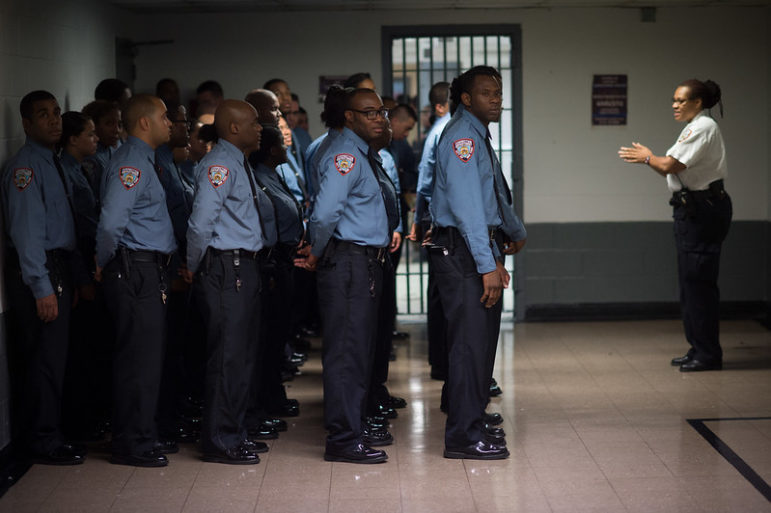
Michael Appleton/Mayoral Photography Office
Correction officers on Rikers Island in 2016.New York City has dramatically decreased its use of punitive segregation—otherwise known as “solitary confinement”—over the past six years. According to the city’s Board of Correction, there were 119 people in as of last June, down 79 percent since June 2014.
That’s still too many people, say correction reformers, who note that human rights monitors have called for an end to prolonged solitary confinement. New York City jails can still put a person in punitive segregation for 60 days, and may seek permission to extend that. In the first half of 2019—the latest period for which data is available—Department of Corrections jail staff requested extensions beyond 60 days on nine occasion, and DOC supervisors approved seven of those requests.
Now, the city might be moving away from punitive segregation altogether. Mayor de Blasio has appointed a four-person task force to come up with a way to end its use.
“The 10,000 corrections officers on Rikers, they know first-hand: solitary confinement doesn’t work. Because they have to deal with people before solitary and after coming out of solitary and they can tell you that people don’t come out saying, ‘Okay, I know what I did and I won’t do it again.’ They learn how to survive in solitary confinement and that’s not what the officers want and that’s not what we should want as a society,” Stanley Richards, a vice president of the Fortune Society who is also a member of the city’s Board of Correction and de Blasio’s new task force, told WBAI’s Max & Murphy Show on Wednesday.
“We have to find a way to separate people without traumatizing them or isolating them and torturing them,” he said. “We have to find a way to hold them accountable.”
Violence has increased in city jails in recent years even as the population has fallen. From fiscal year 2017 through 2019, the average number of people in city detention fell 16 percent. But the rate of violent incidents per 1,000 inmates each month increased 25 percent, and use of force increased 42 percent. (The population is much lower now because of releases during the pandemic, but updated violence data are not available.)
Richards argues that the conversation about corrections in New York City needs “to shift from demonizing just officers.” Even in the infamous case of Kalief Browder, “The real tragedy in their situation is that we had a criminal justice system that chose to prosecute [him], that chose to detain [him]. … Yes, there were some tragedies that happened inside while he was in solitary confinement, the assault, the abuse from the officers. We do have to hold those officers accountable but the real problem is our system.”
When the de Blasio administration restricted the use of punitive segregation in 2015, it was part of a suite of reforms aimed at addressing a crisis at Rikers exposed by media reports and a federal investigation. At that point and for the next two years, the mayor resisted calls for more aggressive change—namely, the closure of Rikers Island. Eventually, de Blasio flipped to supporting Rikers closure, and last year the City Council approved a plan to close the island jails and build a new jail in every borough save Staten Island.
The newly passed city budget included slight changes in the long-term capital spending plan for the borough jails, sparking hope among opponents of the plan that it might be derailed. Richards says the city needs to keep the plan on track.
“The budget crisis in the city is very real, and we have to deal with it, but that doesn’t have to derail our commitment to close Riker’s Island and build borough-based jails,” he said. “We need to rethink the timing and rethink the timing and rethink how we allocate the funds to be able to do that.”
Hear the conversation with Richards below, or the full show, which includes discussion of a possible eviction wave headed New York’s way.
Fortune Society VP and BOC Member Stanley Richards
Max & Murphy Full Show of July 15, 2020
:With reporting by Anika Chowdhury









